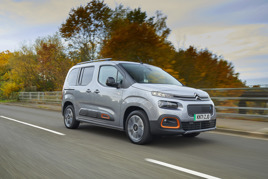Stellantis and Ford remain bullish about their electrified future despite the UK Government’s threat of £15,000 per car fines for OEMs who breach its proposed electric vehicle (EV) sales mandate.
Stellantis UK boss Paul Willcox vowed that the automotive manufacturing giant would transition to a 100% zero-emissions model range by 2030 as Ford of Britain chair Tim Slatter said that yesterday’s launch of consultation over the mandate would give the sector “confidence” about its future direction.
However, Auto Trader commercial director Ian Plummer highlighted the gap to compliance faced by many brands to meet the terms of the 2030 ban on new petrol and diesel car sales.
And despite loopholes which allow cross-brand trading of EV sales credits and borrow from future years’ projected allowances, he suggested OEMs would be cognisant of the stringent fines set to be levied for OEMs who fall short of the mark.
 Plummer said: “The Government has had to accept practical realities today with its watered-down proposals on the Zero Emission Vehicle Mandate. Our data shows that only eight out of 50 brands had EV sales leads of more than 22% in the first two months of 2023, so allowing manufacturers to borrow from future years’ allowances to hit the 22% target in 2024 is common sense.
Plummer said: “The Government has had to accept practical realities today with its watered-down proposals on the Zero Emission Vehicle Mandate. Our data shows that only eight out of 50 brands had EV sales leads of more than 22% in the first two months of 2023, so allowing manufacturers to borrow from future years’ allowances to hit the 22% target in 2024 is common sense.
“Manufacturers will only be allowed to play catch-up for so long however and if they can’t meet the targets, or borrow credits from outperformers, they face steep penalties of £15,000 per non-ZEV car.”
In 2022 full electric vehicles made up 16.6% of new car registrations, according to Society of Motor Manufacturers and Traders (SMMT) data.
In its EV sales mandate consultation document, the UK Government said that it had reached a provisional fine of £15,000 per internal combustion engine (ICE) car sold – and £18,000 per commercial vehicle – after determining that the fine should meet three criteria.
They were that the fines must: be greater than the additional cost to produce a ZEV compared to a comparable conventional ICE vehicle; reflect the price of the excess carbon emissions that would result from selling an ICE vehicle rather than a ZEV; and be at least as high as the equivalent fines for non-compliance in other global markets.
AM reported yesterday (March 30) that Government’s proposed minimum EV sales target begins at 22% in 2024, increasing to 80% in 2030 reaching 100% in 2035.
The proposed minimum EV target trajectory for new vans sold begins at 10% in 2024 and reaches 70% in 2030 on the way to 100% in 2035.
Only vehicles with a zero emissions range of over 120 miles will be covered by the mandate.
Smaller-scale OEMs which sell less than 2,500 vehicles a year will remain exempt from the legislation until 2029, however.
 Commenting on the proposal, Willcox said Stellantis remained “fully committed” to achieve 100% electric new car and van sales in the UK and Europe by 2030, adding: “Furthermore, ahead of the competition, as outlined in our Dare Forward 2030 plan, we will be carbon net zero by 2038.”
Commenting on the proposal, Willcox said Stellantis remained “fully committed” to achieve 100% electric new car and van sales in the UK and Europe by 2030, adding: “Furthermore, ahead of the competition, as outlined in our Dare Forward 2030 plan, we will be carbon net zero by 2038.”
But Willcox also called for greater clarity from government. He said: “We now urgently need to have certainty and regulatory clarity on the pathway that the Government will set, strong support for the industry in making the necessary investments in the manufacture of electric vehicles in the UK and action to develop our battery manufacturing capacity.”
Slatter said: “Ford is on an accelerated path to an all-electric vehicle portfolio and carbon neutrality by 2035, and fully supports the government’s ambition for a zero-emission future.
“The ZEV mandate gives a clear direction and should provide the confidence for infrastructure investors to commit and enable the future for electric vehicles on UK roads.
“With new, higher targets for van customers, it is crucial that the government’s Plug-in Van Grant is retained in early years to support businesses making the switch.”
